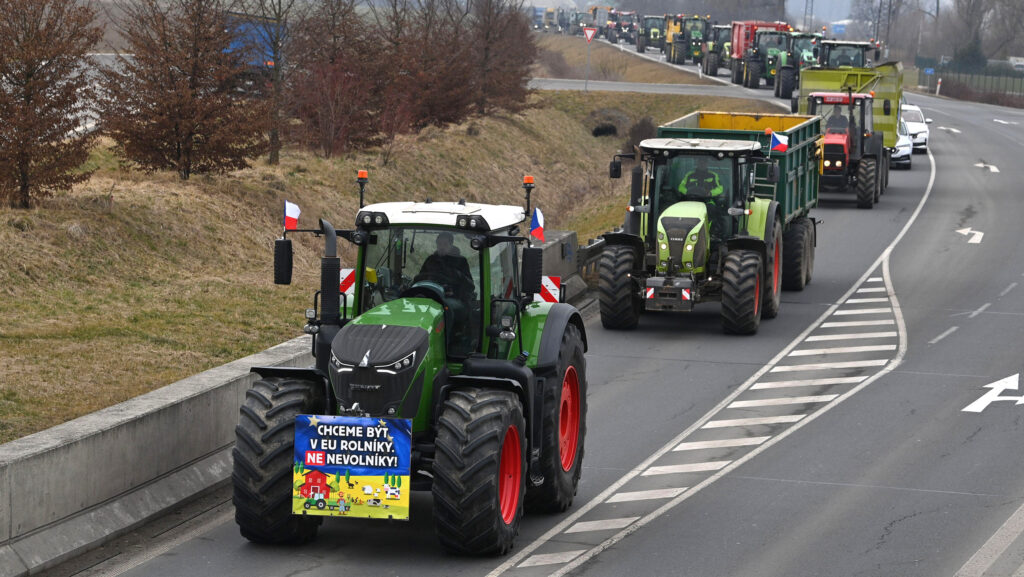Opinion: EU trade deal farming anger mirrors UK frustration
 © CTK/Alamy Stock Photo
© CTK/Alamy Stock Photo British farmers have staged an impressive number of tractor rallies and demonstrations in recent months, triggered by a host of seemingly hostile government policies.
But Continental farmers have their grievances too and, already this year, rampaging French farmers have been out spraying government buildings with manure, while irate Dutch farmers have blocked roads to vent their frustration.
See also: Dry weather across Europe adds support to UK oilseeds markets
About the author

Blaise Baquiche is a Brussels-based journalist with past experience as a Whitehall and Brussels policy adviser.
Here he sets out why Continental farmers are as frustrated with government policy as the Brits.
There are several causes for concern, including Brussels’ attempts to “green” the common agricultural policy.
But it is the prospect of a new free-trade deal with the four South American countries making up the Mercosur bloc – Brazil, Argentina, Paraguay and Uruguay – that is causing the greatest uproar among the UK’s European neighbours.
An EU-Mercosur deal would gradually remove tariffs on over 90% of exported EU goods in return for preferential market access for hundreds of thousands of tonnes of South American beef and poultry.
It will be the biggest trade deal on the planet, the perfect way for Europe to “Trump-proof” itself against an unreliable US.
EU Commission president Ms Von der Leyen’s sign-off on a draft deal at the end of last year was just the first step in the EU’s “sausage-machine” decision-making process.
The deal must now be ratified by the European Parliament and European Council – a tricky proposition, given that France could torpedo it at any stage.
Photoshoot
However, Ms Von der Leyen would not have flown all the way to Montevideo for a photoshoot with the Mercosur premiers if she thought she’d fail at ramming it through the EU’s law-making labyrinth.
So farmers from across Europe have been marching for much the same reason British farmers objected to the post-Brexit deals with Australia and New Zealand.
It is the worry of being undercut by cheaper meat produced to a lower standard. Phrases such as “chlorinated chicken” and “hormone-induced beef” are now mainstays in the EU agri-press.
After UK prime minister Sir Keir Starmer’s “Brexit Reset” summit in May, some of these products could soon wash up on the UK’s shores too.
Talk of “dynamic alignment” means we’ll be back to following EU standards – in the PM’s eyes, a small price to pay to kickstart economic growth.
On the EU-Mercosur plans, something quite unprecedented has happened in Europe. Left-wing politicians and environmental NGOs have joined forces with the main EU farm group, Copa-Cogeca, to denounce the deal.
Climate groups are furious at the EU Commission for seeking a trading relationship with Brazil, which they say is guilty of desecrating the Amazon rainforest.
And farmer groups are furious with the EU Commission which, they say, wants to “destroy our way of life”.
Emergency fund
To quell concerns about lower standards, the EU Commission has cobbled together a €1bn (£850m) fund in case the Mercosur deal has any damaging effects on national markets.
It has also beefed up its certification regime by having inspectors on the ground in South America and a strict list of which producers can ship products to Europe.
But the deal will still allow 99,000t of beef (tariffed at 7.5%) and 180,000t of poultry (duty-free), phased in over five years, which could easily push EU meat towards the UK’s shores.
EU farmers’ concerns seem quite relatable to Brits. “Bureaucratic elites don’t understand what we’re going through”, “they want to change our way of life”, and “it’s all eco-lunacy”.
The narrative is much the same on both sides of the Channel. It’s just the burning of tyres, tearing down of statues and spraying of police with milk that differs.
